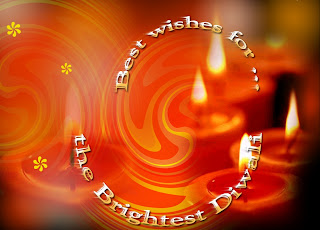Diwali is the most important holiday in India and for millions of Indians around the world. It is also known as the "Festival of Lights". The time of Diwali is a very colorful festive season with many candles in form of oil lamps made of clay, the so-called Diyas or Dipa Lights. These Diya lights (or Ghee Lamps) are placed in and around houses, in hallways, courtyards and in the streets, guiding the pathways to homes and houses for Lakshmi, the Goddess of wealth, prosperity and beauty. The religious worshiping of Hindu Goddess Lakshmi in form of Lakshmi Puja takes place in temples and homes. Also Hindu God Ganesh, easily recognized by his elephant head, is being worshiped during Diwali for a lucky new beginning in life and to overcome obstacles. Children are bursting firecrackers and fireworks illuminating the skies over many Indian cities.
Diwali is the Indian festival that brings a series of festivals with it. One after another, we get a chance to celebrate five ceremonious occasions. The people of all age groups and classes with equal zeal and enthusiasm celebrate Diwali throughout India. They put on new apparels and participate in the various activities that are related to Diwali celebrations. It is a festival of celebrations such as lightings, crackers, cleanliness, colorful rangoli making, social gatherings to exchange greetings and sharing sweets with your loved ones. Diwali is a festival filled with spiritualism and religious activities, such as worship of Goddess Lakshmi, worship of Lord Ganesha, worship of Ma Kali, worship of Lord Chitragupta and worship of Govardhan Parvat.
Diwali is the best time of the year in the Indian culture, especially for children. There are a lot of sweets, a lot of food to be eaten and also little presents being exchanged. Diwali is a 5 day festival, starting 2 days before New Moon in the month Ashvin and ending 2 days after New Moon in the month Kartika on the Hindu lunar calendar. In the western calendar (Gregorian calendar) Diwali varies in date, usually between end of October and beginning of November. The 5 days of Diwali have different meanings and there are many historical legends in Hinduism associated with them. Learn more about the Days of Diwali here. Not only is Diwali being observed by Hindus, but also by Jains, Sikhs and even some Buddhists. It is the major event of the year, celebrated all over India, but also in Nepal, Burma and Sri Lanka, as well as in other countries with a high population of people with Indian heritage. These countries include the United States, Canada, United Kingdom, Malaysia, Singapore, South-Africa, Mauritius, Trinidad, Fiji and many more.
The celebration of the five-day long festival, Diwali, begins on Aswayuja Bahula Chaturdashi and concludes on Kartika Shudha Vijaya. The first day of this festival begins with 'Dhan Trayodashi' or 'Dhanteras'. After the Dhanvantari Trayodashi the second day of Diwali is 'Narak Chaturdashi', which is popular as 'Chhoti Diwali'. The third day of Diwali, which is also called 'Badi Diwali' is the main day of celebrations of the festival of Diwali. People perform Lakshmi Pujan (worship of divine Goddess Lakshmi) on this day and offer prayers to her to bless them with wealth and prosperity. The fourth day of Diwali is devoted to Govardhan Pooja (worship of Lord Govardhan Parvat). The fifth day of the Diwali is Bhai Dooj, the time to honor the brother-sister relationship.






